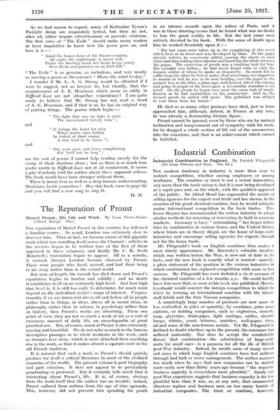The Reputation of Proust
Marcel Proust, His Life and Work. By Leon Pierre-Quint. (Alfred Knopf. 18s.) TfIE reputation of Marcel Proust in this country has followed a familiar course. As usual, London was extremely slow to discover him. Then at last, we became aware of this gigantic work which was unrolling itself across the Channel : articles in the reviews began to be written (one of the first of them appeared in there columns), and finally Mr. C. K. Scott Moncrieff's translation began to appear. All in a minute, it seemed, literary London became obsessed by Proust. There were people who lived, moved, and had their being in his story rather than in the actual world.
But now, at length, the tumult has died down and Proust's reputation begins to harden and solidify ; and no doubt it establishes itself on an extremely high level. Just how high that level is, it is still too early to determine, for much must depend on the individual reader's range of interest. Unques- tionably if we arc interested above all and before all in people rather than in things, in ideas, above all in moral ideas, in philosophy rather than in science, in psychology rather than in history, then Proust's works are absorbing. From one point of view, they are not so much a work of art as a sort of enormous manual of daily life, an encyclopaedia of great practical use. But, of course, much of Proust is also extremely moving and beautiful. We do not refer so much to the famous descriptive passages as to whole incidents in the work, such as Swann's love story, which is more detached than anything else in the work, so that it makes almost a separate conic in the old French tradition.
It is natural that such a work as Proust's should quickly produce for itself a critical literature in most of the civilized countries of the world. The present volume is part biography and part criticism. It does not appear. to us particularly penetrating or profound. But it certainly tells much that is interesting about Proust's, life. It is, of course, obvious from the work itself that the author was an invalid ; indeed, Proust suffered from asthma from the age of 'nine.upwards. This, however, did not prevent him spending his youth
in an intense assault upon the salons. of Paris, and it was in these drawing-rooms that he found what was no doubt to him the great reality in life. But the last years were entirely devoted to his book. With the sense of death upon him he worked feverishly upon it :— •
" His last years were taken up in the completing of this novel which lives as he lived and was developed by time. To the pages already written he ceaselessly added, pasting the sheets to each other and then folding them fanwise and inserting the whole between the pages. The correction of proofs was a crushing task for him. His eyesight was failing ; he had never found time to visit the famous oculist of whom he spoke so frequently. So much did he suffer from the effort he had to make, that sometimes, too impatient to remain in bed, he was to be seen bending over his paper in the porters' box at the Ritz, a glass cage, well heated, where the coming and going of people of the hotel gave a favourable stimulus to his mind. On the proofs he began once more the same task of ampli- fication as he had undertaken on his manuscript. And on the revised proofs he added still more. The publisher was obliged to tear them from his hands."
He died as so many other geniuses have died, just as fame approached him, although, indeed, in France at any rate, he was already a dominating literary figure. '
Proust cannot be ignored, even by those who are by natural inclination and temperament out of sympathy with his work, for he dragged a whole section of life out of the unconscious into the conscious, and that is an achievement which cannot be belittled.














































 Previous page
Previous page